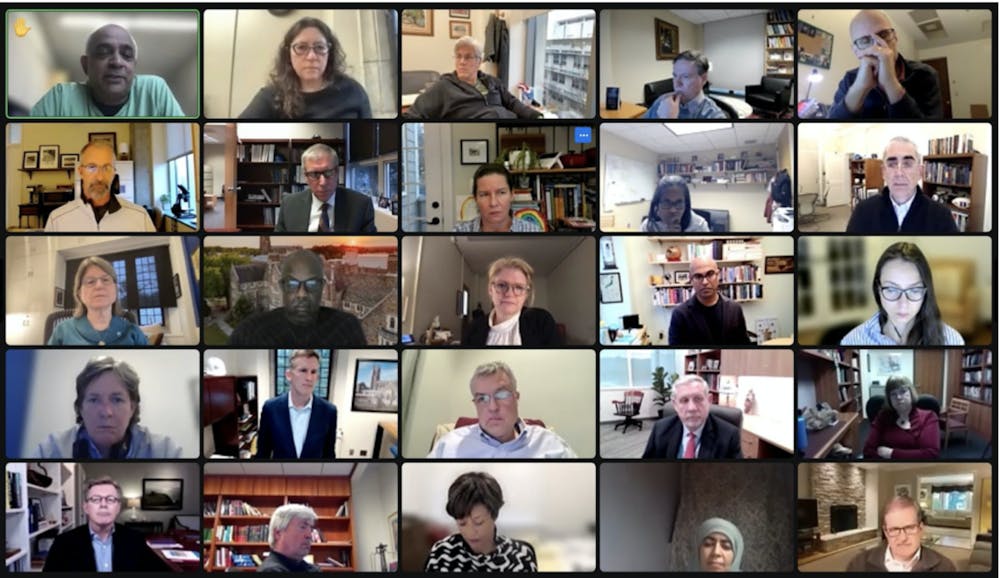The first Academic Council meeting of the year focused on Duke’s return to in-person learning in the context of the Omicron variant. While administrators are optimistic about keeping operations normal under the current conditions, faculty were less optimistic, raising their concerns during the meeting.
Vice President of Administration Kyle Cavanaugh gave a presentation to the Council in which he discussed the latest numbers and updates as the University continues to navigate the COVID-19 pandemic.
More than 30,000 employees—including in the Duke University Health System—and 9,000 students have received a COVID-19 booster dose, according to Cavanaugh, noting that the true number of boosted students is higher than the numbers suggest because some students have yet to report their booster status.
The University also adopted the updated guidance from the Centers for Disease Control and Prevention with regards to quarantine and isolation periods. Now, students who are symptomatic and/or unvaccinated must isolate for 10 days while vaccinated, asymptomatic students can isolate for five days after testing positive. Duke currently still has isolation space for students who test positive for COVID-19. However, Cavanaugh did not rule out the possibility that students would have to isolate in their dorm rooms if cases increased.
“Our isolation capacity is holding up. We have a plan A, a plan B, a plan C,” Cavanaugh said. “If we got into a really, really high level—we’re not there yet—we would then go to where our peers are if we needed to isolate in place. But we’re not there yet.”
Cavanaugh explained Duke’s shift to online classes was due to anticipated high rates of COVID-19 as students returned to campus and the lack of logistical support to handle that as opposed to a concern over health status.
The University did see an initially high volume of positive tests, but according to Cavanaugh, the “overwhelming majority of these people were asymptomatic.”
“In these numbers here that we have, we haven't had a single individual out of this group that's been hospitalized,” Cavanaugh said.
Undergraduate, graduate and professional courses returned to in-person instruction Tuesday. While Cavanaugh was “personally thrilled that faculty are back in the [classroom] this week,” some faculty at the meeting were less than pleased.
“I get the sense that Duke has shifted [from] trying to tamp down transmission to saying, ‘Transmission is going to occur. We're just going to live with it.’ And I wonder if Duke has actually adopted that policy,” said Prasad Kasibhatla, professor in the division of environmental sciences and policy. “And if so, how are we accounting for things like long COVID, which we don't understand fully?”
Provost Sally Kornbluth responded, saying that living with COVID-19 is recognizing that the virus is here to stay.
“Saying we’re going to live with COVID-19 is not implying, ‘Just let it rip,’” Kornbluth said. “It's implying that we need to accept the fact that magical thinking is not going to make it go away and we have to think of long term coping strategies.”
Kasibhatla also asked if Duke is modeling transmission at the scale of particular events, such as basketball games or having classes with full density. The University is not modeling such cases, Professor of Biology Steven Haase said.
Campbell Harvey, J. Paul Sticht professor of international business in the Fuqua School, asked whether Duke plans to mandate the use of KN95 masks. He noted that some students in his class show up with cloth masks on, which is “really unsatisfactory.”
Cloth masks have been shown to be less effective in preventing transmission than surgical, KN95 or N95 masks. Duke announced they would deliver KN95 masks to every undergraduate student’s dorm room, and those living off campus have opportunities to pick one up at surveillance testing sites.
Kornbluth said that the administration has been in “active conversation” about mandating the use of the KN95 masks.
“We would consider mandating it if we can source enough K95 for all of the students,” said Kornbluth. “It's not really fair to mandate because we have students with all sorts of income ranges, accessibility, etc.”
Harvey also asked whether the University planned to install HEPA filters inside classrooms, to which Kornbluth added that it was something they could “certainly look into.”
Professor of Law Sara Greene asked how Duke is considering those employees with children under the age of five, who are not eligible to receive the COVID-19 vaccine.
“Preschools are closing left and right for, you know, five days, 10 days, two weeks, and I'm wondering, you know, kids under five usually can't take care of themselves,” Greene said. “How [is] the University thinking about that for staff who are generally required to come in? Are they required to use their sick days? Or have additional days been given?”
Kornbluth said that if a faculty member needed to work remotely because of such “transient issues,” they could do so, even though the default is to have in-person instruction.
Kasibhatla added that he heard concerns from younger, untenured faculty about asking for permission to go online temporarily due to rapidly-changing conditions. Kasibhatla said that having the University’s COVID-19 dashboard updated daily could help faculty make day-to-day decisions about whether to work in person or not.
“I would argue that the daily numbers are no more actionable than the weekly because they're changing so rapidly, that we don't actually expect people to be making day to day changes,” Kornbluth said.
Kornbluth also provided an update on Duke Kunshan University in a closed session not open to the press.
Get The Chronicle straight to your inbox
Signup for our weekly newsletter. Cancel at any time.

Adway S. Wadekar is a Trinity junior and former news editor of The Chronicle's 119th volume.

